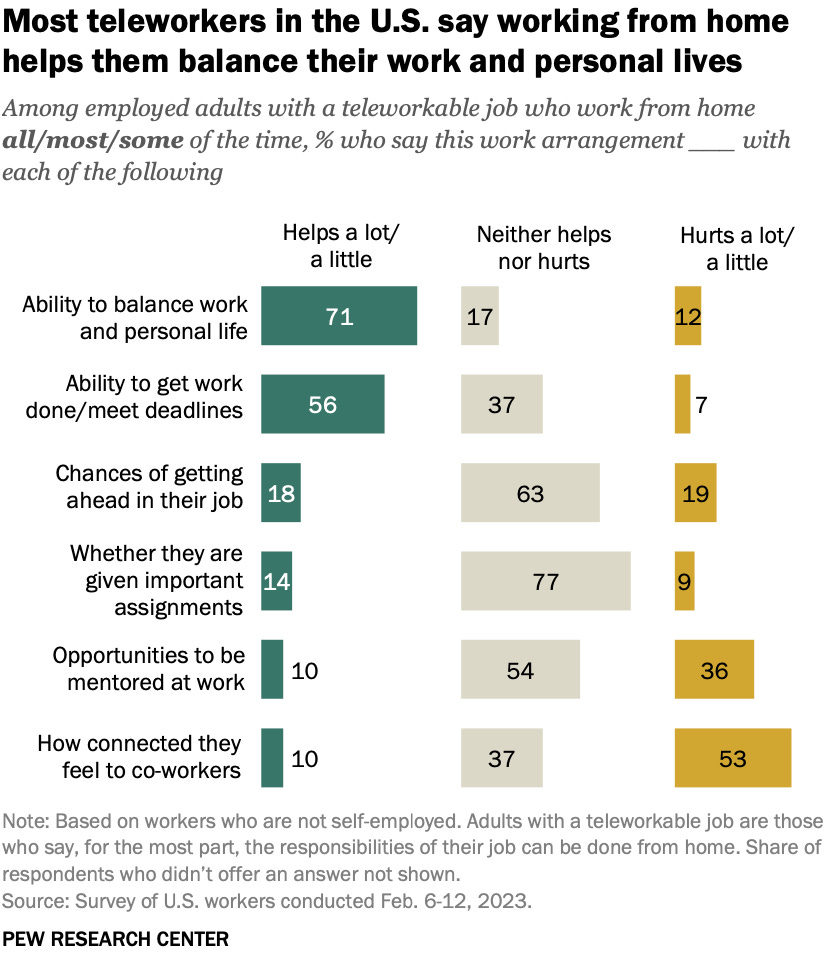“C.E.O.s may rant about lazy or (per Musk) “immoral” workers who don’t want to go back into their cubicles, but the purpose of an economy is not to make bosses happy.”
Paul Krugman, Nobel Prize-winning economist and NY Times opinion columnist. NY Times May 22, 2023
I read Krugman’s Times op-ed a few days ago and have been thinking about it ever since. He discusses a few ways remote work impacts our economy, focusing primarily on the reduction in commuting time, and how that impacts both the Gross Domestic Product (GDP) and perhaps more importantly, our personal lives:
But it’s not hard to make the case that the overall benefits from not commuting every day are equivalent to a gain in national income of at least one and maybe several percentage points. That’s a lot: There are very few policy proposals likely to produce gains on that scale.
For the last few years, I’ve been thinking about the additional benefits of remote work—not only the literal commuting time (and if you drive, the cost of fuel, car wear and tear and stress of daily traffic), but the less talked-about and less quantifiable pluses of working from home.
For me and millions of other workers, it’s the upfront time, energy and monetary cost of “getting ready” for work for which the employer does not pay: packing lunch (who can afford to purchase a $20 sandwich everyday), getting dressed, which includes purchasing work appropriate clothes and attempting to fashion at least a passable, professional look. These efforts exponentially add to the time, money and personal energy expenditure of working in an office. And I hate to admit this in 2023, but it looks like women still hold the edge in time spent getting ready for work, with make-up application and putting together an “outfit” rather than a suit and tie uniform. Research shows that women also complete more household tasks before work, like feeding children and pets, and even starting dinner in the morning, which gobbles more personal time and energy before one even arrives at their paying job.1
And let’s not forget leaving our pets behind for nine hours a day. They need us and we need them, and it’s comforting and stress reducing just to be able to pet them and take them for a short walk at lunch, without driving to and from work again. Why should an employer pay for therapy dog visits to the office when you have yours at home?

Since the pandemic’s initial lockdown ended and employers began encouraging and then requiring employees to return to the office, there has been a bit of an employee rebellion. Some workers quit their jobs outright, others retired early, and for those who stayed with their pre-pandemic employment, they continued to search for jobs that paid more and offered more flexibility (like working from home or a least a hybrid arrangement). Workers who remained in their positions also engaged in “quiet-quitting”, where they simply decided to do the minimum required of their jobs and nothing else. And none of these choices benefit the employer.
I had the privilege of working remotely for two and a half years during the pandemic, and the benefits to me were enormous — out of bed a half hour or so before my login time, making tea and breakfast and working in my robe until noon-ish. There was almost no energy expended toward any other tasks except work — a plus for both my employer and me. And yes, I effectively earned more money after eliminating commuting costs, and leaning into a robe, sweatpants and T-shirts as wardrobe staples.
I am not praising a slovenly look for conducting business, even if you are in the privacy of your own home, but rather pointing out the virtues of choice, including how and why you expend your energy. And workers’ choice is a threat to employers because it tips the balance of power. Remember how over half of the states reacted when they thought employees were getting the upper hand with the extra unemployment benefits dispensed through the Cares Act? Employees had the audacity to pick and choose what jobs, pay scale and benefits suited them best. Twenty-six states ripped the extra $300 from unemployed workers’ hands, even if it was just a few months before these extra funds were set to expire. These states claimed that potential employees were wallowing in their newfound wealth and purposely delaying a return to work, but data collected after the extra benefits expired proved otherwise.
By insisting on a return to the office, it is now the employers who are rebelling, apparently against more rested and relaxed workers who can devote more of their energies to work, but who are out of their direct, daily control. I understand the majority of American workers don’t have the option to work from home, but according to data gathered in February 2023 by Pew Research Center, of those employees who have the choice, close to 35% work fully remotely, up from only 7% before the pandemic. This PEW Research Center chart breaks down exactly why employees prefer working from home.
What is most important to me about Krugman’s opinion piece is his explanation of the purpose of an economy, not an issue that a layperson (and someone fundamentally unschooled in economics) like me has explored in any detail. I have a basic belief that our government should organize around and devote its resources to support the common good, but it is the full power of our economy that should be organized to embrace and support this principle, too. Krugman, recognized for his work in economics with the Nobel prize (clearly not a layperson), says:
…the purpose of an economy is not to make bosses happy, [but rather] …to serve human needs, not generate favorable statistics.
Until the pandemic forced us to remain in our homes (if we were lucky enough not to be frontline workers), most employees never questioned whether they needed to head to an office for nine to ten hours each day, five times a week. According to a Vox article written in early 2022, that offered its take on why employees were balking at a forced return to the office: “… going to the office never really worked for everyone, it was just what everyone did.” Now that remote work is becoming an acceptable and valid choice, employees are choosing what serves their needs, and statistics seem to demonstrate that employers benefit too.
——————————————————————————————————————
What are your thoughts on working from home versus the office? How many of you would work remotely if given the choice? Feel free to share your ideas in the Comment Section below.
If you are not already a subscriber, why not take this opportunity to join our community with a free or paid subscription? A new paid subscription or an upgrade from a free to paid subscription will allow me to expand this newsletter with additional, primary source information, like interviews and public information requests, and expanded podcast offerings to include real, live guests. Although I won’t be going on strike any time soon, the current TV writer’s strike demonstrates that writer’s deserve to be paid, and paid well for their work, just like any other profession. Thank you in advance for your financial support of my writing!
I’m not sure I agree with either the statistics or analysis in this piece, but anecdotally, I can’t imagine the average man taking more time than the average woman to get ready to go to work. https://today.yougov.com/topics/society/articles-reports/2012/07/10/morning-routine-30-spend-over-week-getting-ready-e














Share this post